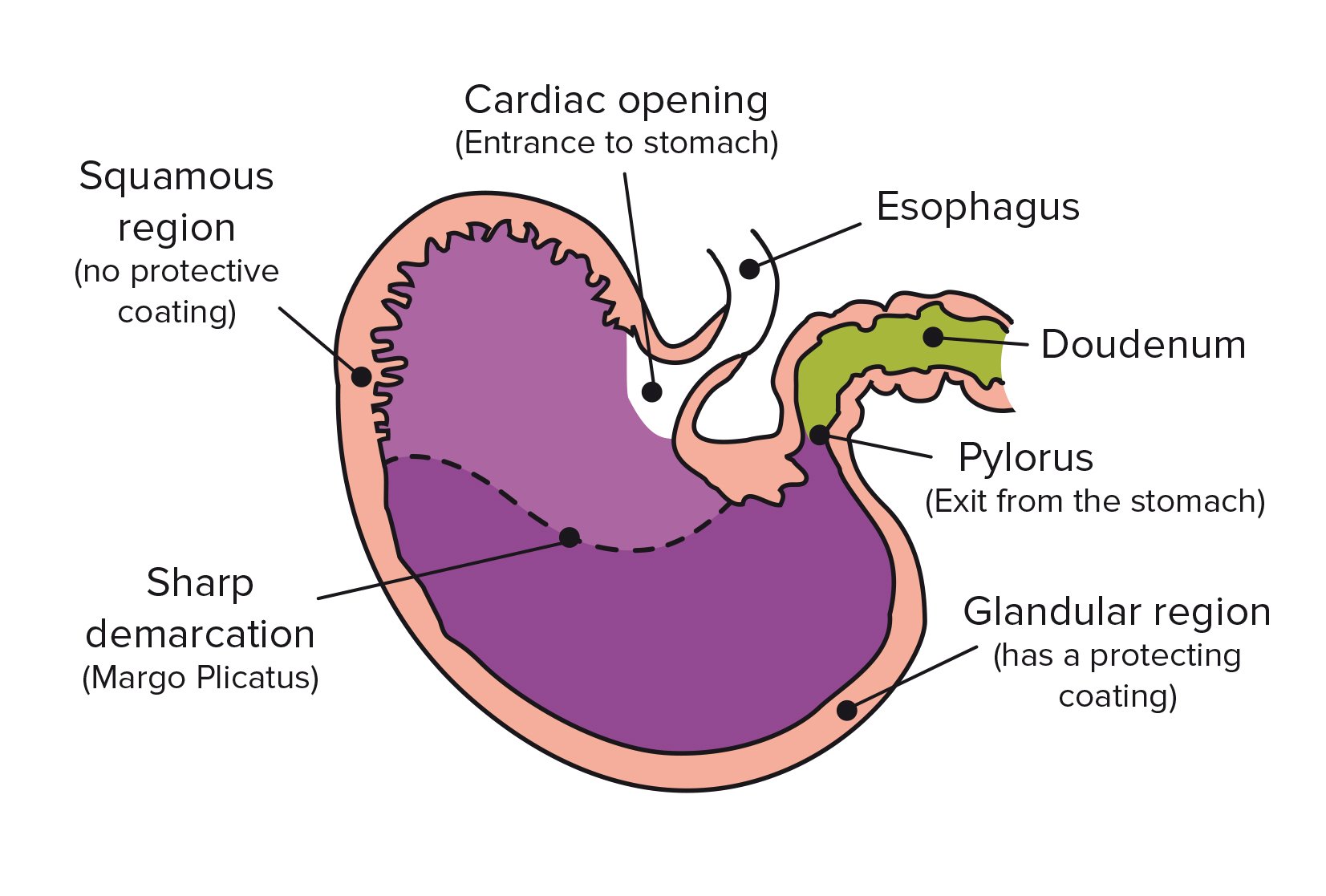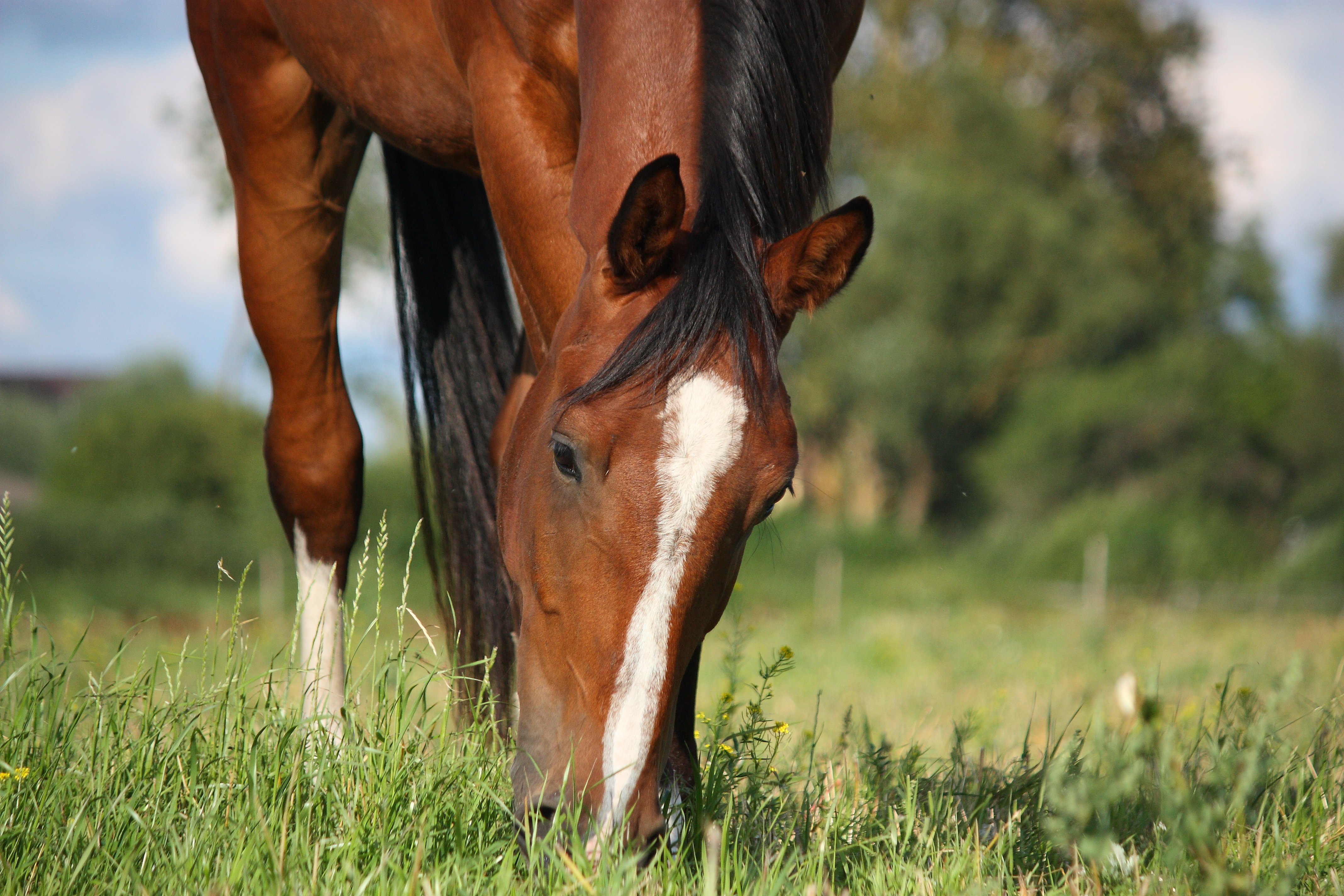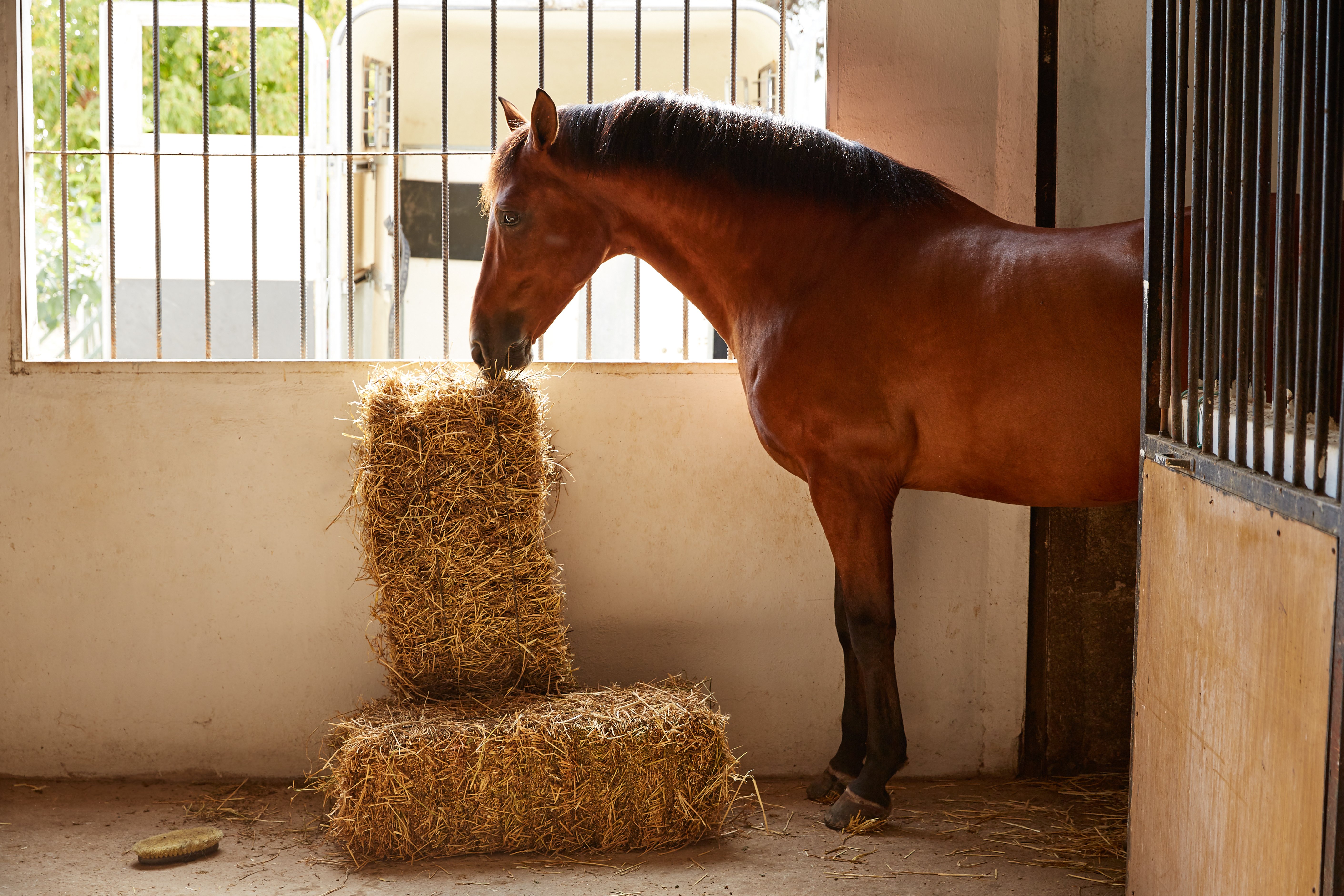Is Omeprazole a long-term solution against gastric ulcers in horses?
4 min. read time
Audio version – listen to this article easily
"I have really tried everything with my horse with gastric ulcers" or "I don't want to give my horse permanent medication against his gastric ulcers" are statements we hear again and again. For many horse owners, the treatment of a gastric ulcer is time-consuming and expensive, because medicines such as omeprazole are expensive. Are you, as a horse owner, looking for an alternative for a variety of reasons? You will find it here!
Are you interested in specific questions? Then click here to get directly to the chapter:
Equine Gastric Ulcer Syndrome (EGUS) is a common and significant health issue affecting horses of all breeds and ages. It is characterized by the presence of lesions in the squamous (upper) or glandular (lower) regions of the stomach. These lesions are often caused by prolonged exposure of the gastric mucosa to gastric acids, leading to inflammation, erosion, and ulceration of the stomach lining.
Understanding the underlying causes and risk factors of EGUS is crucial for effective prevention and treatment. Factors such as stress, feeding, and medication can all contribute to the development of EGUS, making it essential for horse owners to be vigilant and proactive in managing their horse’s gastric health.
One common treatment for EGUS is the use of proton pump inhibitor medication, such as omeprazole, which helps reduce stomach acidity and promote healing of ulcers.
In order to achieve effective treatment of gastric ulcers, a little prior knowledge about the anatomy of the horse's gastric is required. The single-cavity gastric is quite small in relation to the horse's body size and holds only up to 15 litres. The entrance to the gastric (cardia) connects the oesophagus with the gastric. The horse's gastric belongs to the group of compound stomachs. The reason for this is the differentiation into two parts - the upper part with a squamous mucosa and the lower part with a glandular mucosa. The margo plicatus separates the two areas from each other in the form of a border line. The stomach outlet is called the pylorus and connects the stomach with the small intestine.

The upper, squamous part of the stomach contains no mucus-secreting glands that could form a protective layer against stomach acid. Therefore, the sensitive mucous membrane is particularly affected by an excess of gastric acid. If gastric acid reaches the gastric wall, this can lead to irritations, so-called lesions, within a very short time. Within 24 to 48 hours, irritation of the mucous membrane can develop into a crater-shaped gastric ulcer. The Latin term “ulcer” translates as "deep defect of the skin".
Although ulcers occur less frequently in the glandular part, they should not be disregarded, especially since the causes are often even more difficult to fathom here, since gastric acid is permanently present and can be ruled out as the only trigger.
Gastric acid secretion is a natural process that helps break down food in the stomach. However, excessive gastric acid secretion can lead to ulcer formation.
In horses, the stomach has two sections: the upper squamous region and the lower glandular region. The upper region is more prone to ulceration due to its limited defense mechanisms and exposure to acidic gastric juices.
Gastric acid secretion is regulated by various factors, including hormones, nerves, and the presence of food in the stomach. Imbalances in these factors can lead to excessive gastric acid secretion and ulcer formation.
Understanding these mechanisms is key to preventing and managing equine gastric ulcers effectively.
Before a gastric ulcer develops, an irritation of the stomach mucosa precedes it. The term Equine Gastric Ulcer Syndrome (EGUS) covers all lesions. A distinction is then made between Equine Squamous Gastric Disease (ESGD, ulcers of the non-glandular mucosa) and Equine Glandular Gastric Disease (EGGD gastric ulcers of the glandular mucosa). They can occur separately and together.
In order to be able to select a suitable medication or supplement for the horse's gastric, an exact diagnosis is required, because ESGD and EGGD are not only different in their cause but also in the treatment methods.
Causes for gastric ulcers in the squamous part are often feed-related, whereas the cause for ulcers in the glandular mucosa is often stress. Ulcers at the Pylorus can be the result of mechanical irritation by feed such as alfalfa, but can also be caused by a backflow of predigested food from the small intestine.
Only a gastroscopy can provide information about the severity and localisation of the mucosal irritation or gastric ulcer. The lesions are classified according to their severity using the ulcer score (0-4). Depending on the diagnosis, the treatment method is then recommended by a veterinarian.
The causes of gastric ulcers are manifold - they can be caused by wrong feeding or bad husbandry, be a consequence of longterm-medication or occur due to stress. The assumption that only competition horses suffer from stomach ulcers is wrong. Approximately 40 % of leisure horses and 50 % of foals are also affected.
Horses are evolutionarily continuous eaters, and their stomachs are designed for this and are prepared to continuously consume small amounts of roughage. For this reason, gastric acid (HCl) is permanently produced so that the digestion process does not come to a halt.

Stomach acids play a crucial role in the digestive process by activating digestive enzymes like pepsin, which is essential for protein breakdown.
The natural gastric acid buffer is bicarbonate. This is found in the horse’s saliva, which is secreted just during the chewing process. In the wild, where constant grazing was guaranteed, horses produced enough saliva so that bicarbonate and stomach acid were naturally in balance.
Nowadays, the husbandry and feeding of horses has changed a lot. Less free movement and small amounts of roughage as well as irregular feeding times, intensive training, unloved box neighbours, a heterogeneous group composition on the pasture and much more can cause stress for some horses. Implementing proper husbandry and feeding practices is crucial for preventing gastric ulcers in horses.
Veterinarians often say that stress-related overproduction of gastric acid is the main cause for a gastric ulcer. Gastric acid per se is not a bad thing. The horse's stomach is dependent on gastric acid because it plays an important role in digestion. On the one hand, it moistens the food pulp and prepares the food for further digestion, and on the other hand, it also kills bacteria in the feed.
But as always, the dose makes the poison! The horse cannot handle a permanent surplus of stomach acid. If there is too much acid in the stomach, it spills around like a small lake and damages the squamous mucous membrane. Especially when trotting and cantering, horses show discomfort and signal pain. That is why you should never ride your horse on an empty stomach.
Stress has also another influence: the cortisol level is increased during stress, which leads to a reduced blood supply to the stomach lining, which thus has a reduced resistance and cannot regenerate quickly enough. An irritation of the gastric mucosa in turn causes the horse pain, which further stresses the horse. This creates a kind of vicious circle. Stress should therefore be avoided as much as possible in the horse's environment.
In addition to optimising husbandry, feeding and training, you can treat your horse with medication or support it with a supplement. Three types are distinguished here.
Proton pump inhibitors like omeprazole can reduce stomach acid production by up to 99%, giving the damaged mucous membrane time to regenerate.
Omeprazole is a commonly used proton pump inhibitor (PPI) for treating EGUS in horses. While it is effective in reducing gastric acid secretion and promoting healing of ulcers in the squamous region, it has some limitations.
Omeprazole may not be effective in treating ulcers in the glandular region of the stomach. This region has a protective coating and is used to stomach acid. In most cases ulcers in the glandular region respond better to treatment with sucralfate.
While omeprazole is effective in treating gastric ulcers by suppressing stomach acid secretion, long-term use can lead to several complications. One of the most significant concerns is rebound acid hypersecretion (RAH). This condition occurs when the stomach starts producing excessive amounts of gastric acid once the medication is stopped, potentially worsening gastric ulcers and other gastrointestinal issues. Recent studies have found that this effect is short-lived, but the first 48 hours after medication has stopped are critical.
Another complication is reduced protein digestibility. Omeprazole suppresses the production of stomach acid, which is essential for breaking down proteins. Over time, this can lead to nutritional deficiencies and impact the horse’s overall health. Additionally, long-term use of omeprazole can alter the gut microbiome, the community of microorganisms living in the digestive tract. These changes can negatively affect the horse’s digestive health and immune function.
Stomach acid is also needed to neutralize germs and bacteria in the food mash. Suppressing the acid means suppressing this natural barrier of entry and might cause illness.
Given these potential risks, it’s crucial to work closely with an equine vet to monitor the horse’s response to omeprazole and adjust the treatment plan as needed. This approach helps minimize the risk of complications while effectively managing gastric ulcers.
If your horse has been diagnosed with a gastric ulcer, the next step is to develop a comprehensive treatment plan tailored to its specific needs. This plan typically involves a combination of medication, dietary adjustments, and management strategies to reduce stress and promote healing.
Omeprazole is often prescribed to suppress stomach acid production and facilitate the healing of ulcers. Alongside medication, making dietary changes can significantly impact recovery. Feeding smaller, more frequent meals and ensuring constant access to fresh water can help reduce the strain on the stomach and promote healing.
Management strategies are equally important. Reducing stress, providing adequate rest and exercise, and avoiding the use of NSAIDs can all contribute to a healthier stomach environment. It’s essential to work closely with your veterinarian to develop and implement a treatment plan that addresses all aspects of your horse’s health, ensuring optimal healing and preventing recurrence of the ulcer.
Acid-producing cells, such as the vestibular cells in the stomach, need protons, such as potassium and hydrogen, to produce pepsin and HCl. These substances are transported via a proton pump. The active ingredient omeprazole is a proton pump inhibitor and belongs to the group of stomach acid blockers.
The active ingredient inhibits the H+/K+-ATPase enzyme system, which acts as an acid-proton pump in the stomach mucosa. This inhibition of the proton pumps reduces gastric acid secretion by up to 99 %, so that the mucous membrane no longer comes into contact with HCl and has time to regenerate. Omeprazole treatments can last several weeks, depending on the severity of the stomach ulcer.
In acute, bleeding gastric ulcers in the squamous part of the stomach, the use of omeprazole is absolutely recommended. In order to document the healing process of a gastric ulcer, a control gastroscopy is useful. A gastroscopy is stressful for many horses, as long periods of fasting are a prerequisite for an effective examination. Talk to your vet about the pros and cons of gastroscopies and when a follow-up is appropriate.
In addition to the endoscopic imaging procedure, you should also monitor your horse closely for any improvement in symptoms. Premature discontinuation of omeprazole can lead to a relapse.
To prevent a relapse after the omeprazole treatment, you as a horse owner should take precautions and look for a long-term solution, because medication should not be a permanent solution.
The risk of getting a gastric ulcer again can never be reduced to 0 %, but you can take some prophylactic measures. Especially husbandry and feeding have a great influence on the health of your horse.



If you are in a boarding stable, some aspects are certainly out of your hands, such as roughage feeding. However, as a horse owner, you can start with small things. You have a great influence on your horse. If you come to the stable stressed, this will also affect your horse. So start with yourself and create a more relaxed atmosphere in the stable and while riding.

In order to draw attention to the topic of the horse's stomach health, it is a good idea to talk about it in the stable aisle and to sensitise not only stable colleagues but also the stable owner, because in the end the welfare of the horses always has the highest priority.
The topic of stress prevention is really important if you want to prevent a relapse in your horse. However, since stressors can never be completely avoided, it can be helpful to buffer excess gastric acid, e.g. with a gastric supplement.
In the case of acute, bloody gastric ulcers, the administration of medications containing omeprazole is recommended. This gives the mucous membrane the opportunity to regenerate. If you want to switch to a natural supplement like Equine 74 Gastric, it is important to phase out omeprazole. This way, the stomach slowly gets used to the production of gastric acid again.
We recommend that our customers start feeding Equine 74 Gastric about two weeks before they plan to stop taking omeprazole. For this purpose, a dosage of one teaspoon of Equine 74 Gastric should be started. Until omeprazole is discontinued, the amount of Equine 74 Gastric can then be increased to the recommended amount of 50 g per day (500 kg warm-blooded horse). It is best to divide the feeding into two to three rations per day. If this is not possible, we recommend feeding before the longest feeding break, which is usually in the evening.
To avoid a relapse after a course of omeprazole, a stomach supplement should be fed for support during the transition. Equine 74 Gastric can be used both as a 6-week regimen and as a permanent part of the feeding routine. In order to achieve lasting therapeutic success, the primary cause must be eliminated.
Are you looking for a long-term solution that is free of chemicals and cost-intensive medication?
Equine 74 Gastric is based on red algae harvested off the coast of Iceland, which counteracts the excess acidity in the horse's stomach caused by feeding and stress. The organically certified formula is characterised by a high bioavailable calcium content. This increases the acid buffering capacity, which is 2.5 times higher than comparable limestones and thus binds stomach acid. Equine 74 Gastric is a gastric acid buffer that only binds the excess stomach acid so that the stomach acid needed for the digestive processes is still present. In this way, the pH value in your horse's gastric becomes more and more balanced.
Highly bioavailable calcium and magnesium
Special sponge structure: slowly decomposed in the horse's stomach for an acid buffering time of up to 8 hours
Normal & necessary function of gastric acid is maintained
Available in two variants (powder, pellets)
Doping-free
100 % natural
Scientifically proven
No side-effects
Equine 74 Gastric
Buffers the excess acid in the horse's stomach instead of blocking it.
Equine 74 Stomach Calm Relax
Supports the nervous horse stomach in stressful situations.